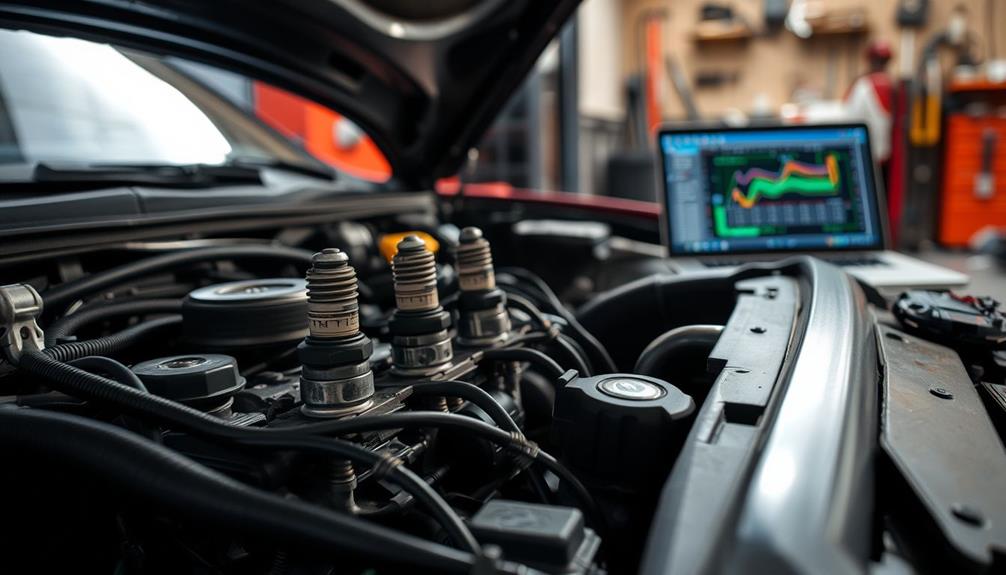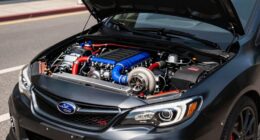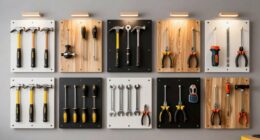Car tuning boxes can definitely boost your vehicle's performance, offering gains like 30-60 bhp and improved throttle response. However, these devices often come with risks, such as engine management issues and potential long-term damage. You might experience inconsistent power delivery and overheating problems due to excessive pressure. While users enjoy immediate thrills, many report dissatisfaction over time. For safer and more reliable performance, custom ECU tuning is frequently preferred. So, if you're curious about finding the best option for your car, you might want to explore the benefits and drawbacks further.
Key Takeaways
- Tuning boxes can enhance horsepower by 30-60 bhp and torque by up to 90 lb-ft, providing noticeable performance gains initially.
- Risks include inconsistent power delivery, engine management issues, and potential long-term damage due to lean mixtures and overheating.
- Throttle control oscillation can lead to torque fluctuations, negatively impacting driving experience and increasing the risk of clutch slip.
- Custom ECU calibrations offer safer, more reliable performance with consistent power delivery and better engine health compared to tuning boxes.
- While tuning boxes may offer short-term excitement, many users report dissatisfaction with long-term reliability and performance stability.
Understanding Car Tuning Boxes
Car tuning boxes are popular aftermarket devices that many drivers consider to enhance their vehicle's performance. These tuning boxes modify engine performance by manipulating sensor signals, often boosting horsepower by 30-60 bhp and torque by up to 90 lb-ft compared to stock configurations. However, it is important for drivers to use caution when installing tuning boxes, as improper installation or excessive tuning can lead to engine damage and voided warranties. It is also vital to consider the specific needs and limitations of each vehicle, as car tuning box effectiveness can vary depending on the make and model. Despite potential risks, many drivers are drawn to the allure of increased performance and fuel efficiency that tuning boxes can provide.
They work by tricking the engine control unit (ECU) into adjusting fuel delivery and boost pressure, leading to impressive initial gains in power.
However, while you might enjoy the enhanced performance, it's crucial to understand the potential drawbacks. Tuning boxes can cause overboost scenarios and torque oscillations, particularly in the 2000 to 4000 RPM range due to throttle control issues. This can compromise your engine's reliability and even lead to long-term damage, such as increased knock sensor activity and a lean fuel mixture under heavy loads.
Though tuning boxes may seem like a quick fix for better engine performance and improved fuel economy, they mightn't be the safest or most effective solution. Custom ECU calibrations provide more significant performance gains and better throttle response, making them a more reliable choice for sustained power increases without risking your engine's health.
Performance Gains Vs. Risks
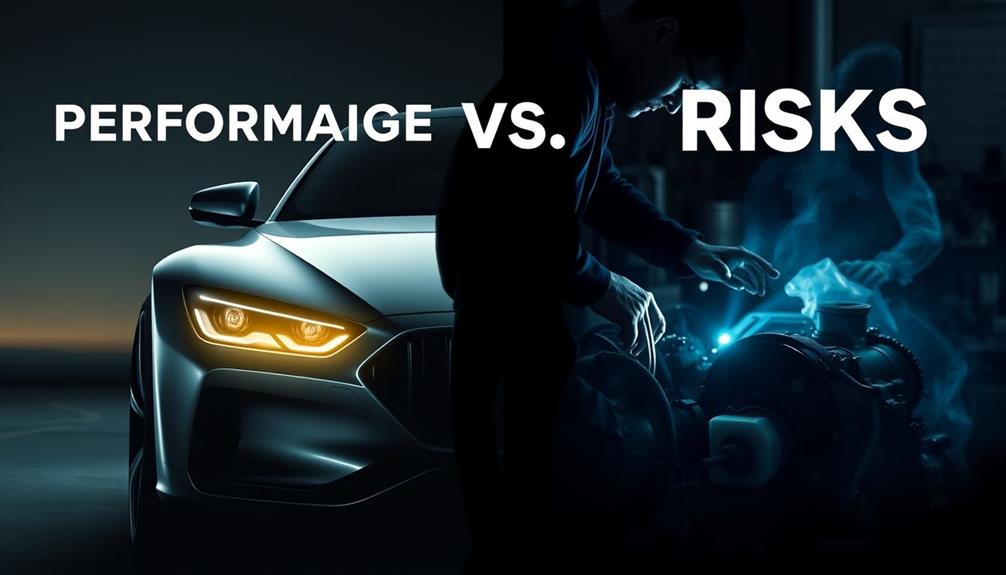
When evaluating whether to install a tuning box for improved performance, it's essential to weigh the potential gains against the risks involved. Tuning boxes can promise impressive performance gains, like an increase of 40 bhp and 60 lb-ft of torque over stock. However, these gains often come with significant risks related to engine management.
Here are some key points to reflect on:
- Engine management issues: Tuning boxes manipulate ECU sensors, which can lead to overboost and unstable torque delivery.
- Increased knock sensor activity: A lean mixture can result from tuning boxes, risking long-term engine damage under heavy loads.
- Performance versus reliability: While tuning boxes may boost power, custom ECU calibrations offer more balanced performance and safer operation.
- Driveline safety: Richer lambda settings in custom tunes reduce the risk of clutch slip, enhancing overall driveline safety.
Engine Management Concerns
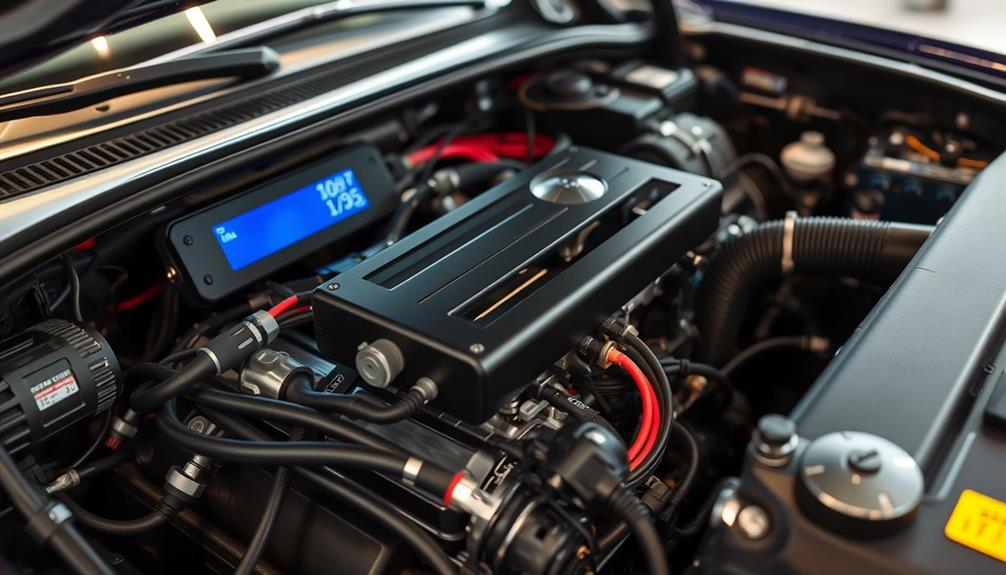
When you use a tuning box, you're risking overboost scenarios that can put your engine's reliability on the line.
You might also experience throttle control oscillation, leading to inconsistent power delivery that affects your driving experience.
It's essential to contemplate how these issues could lead to long-term engine damage if left unchecked.
Overboost Scenarios Explained
While tuning boxes can seem like an easy way to boost your vehicle's performance, they often introduce significant risks, particularly regarding overboost scenarios.
Overboost occurs when the tuning box tricks your ECU into delivering excessive boost pressure, which can harm engine longevity and compromise your driving experience.
Here are some concerns related to overboost scenarios:
- Increased knock sensor activity: Lean mixtures can lead to engine knock, especially under heavy loads.
- Unreliable performance metrics: Tuning boxes can't adapt to changes in airflow and torque like custom ECU calibrations can.
- Oscillating torque: You may experience torque fluctuations between 2000 to 4000 RPM due to throttle control inconsistencies.
- Reduced driveline safety: Improper torque reporting increases the risk of clutch slip in dual-clutch transmissions.
Throttle Control Oscillation Issues
Throttle control oscillation issues can greatly impact your driving experience, especially when using tuning boxes. These devices often manipulate throttle control, leading to inconsistent power delivery between 2000 to 4000 RPM. You might find that your vehicle's responsiveness becomes unpredictable, which can be frustrating during acceleration or merging.
The root of the problem lies in the engine management system's inability to adjust for real-time engine conditions while a tuning box is in play. This can trigger increased knock sensor activity, signaling potential engine stress that you're likely unaware of.
Furthermore, the tuning box may cause a lean fuel mixture, further compromising performance and increasing wear on your engine.
You may also experience overboost scenarios, which can create a surge of power but at the risk of damaging your engine under hard load conditions.
Ultimately, the oscillation in throttle response not only detracts from the smoothness of your drive but also raises concerns about the long-term reliability of your vehicle.
If you're considering a tuning box, be mindful of these throttle control oscillation issues and how they might affect your overall driving experience.
Long-Term Engine Damage Risks
Many drivers underestimate the long-term engine damage risks associated with tuning boxes, especially regarding engine management concerns.
While these devices can boost performance, they often manipulate engine sensors in ways that lead to serious issues.
Here are some potential risks you should consider:
- Overboost Scenarios: Tuning boxes can create excessive pressure and heat, leading to engine damage.
- Inconsistent Throttle Control: The oscillating torque between 2000 to 4000 RPM can increase the chance of engine knock, resulting in potential damage.
- Lean Air-Fuel Mixtures: Increased activity from knock sensors may cause pre-ignition issues that threaten engine longevity.
- ECU Limitations: Tuning boxes often prevent the ECU from adjusting for real-time engine conditions, exacerbating wear on components during hard loads.
In contrast, custom ECU calibrations adapt to actual airflow and torque, greatly reducing the risk of engine damage.
By relying on tuning boxes, you might be sacrificing your engine's health for short-term gains.
It's essential to weigh these long-term implications before making any decisions about performance enhancements.
Custom Tuning Advantages
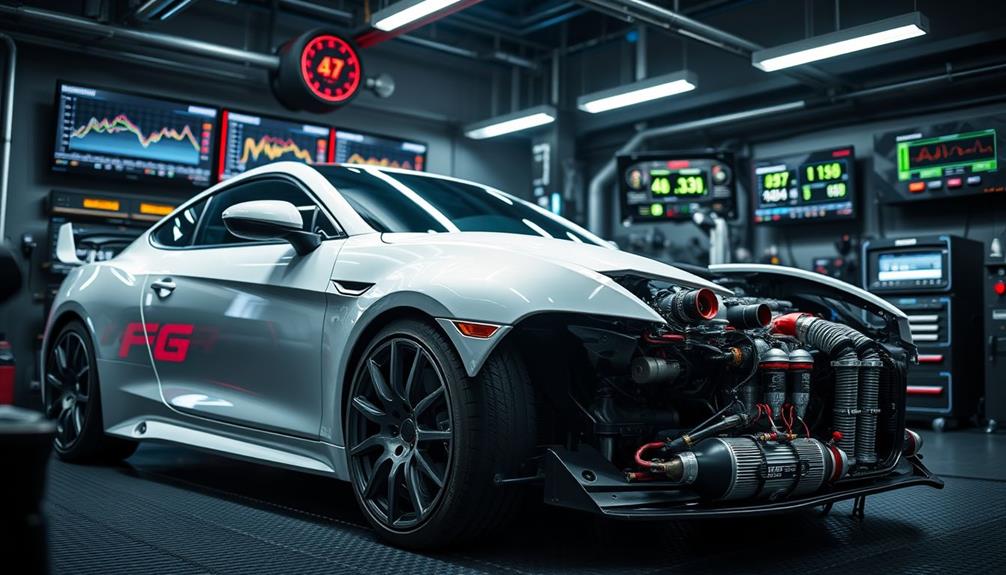
When it comes to maximizing your vehicle's performance, custom tuning offers distinct advantages over traditional tuning boxes. Custom tuning can provide you with significant power enhancements, achieving up to 520 bhp and 590 lb-ft of torque. That's an impressive additional gain of 30 lb-ft torque and 20 bhp compared to tuning boxes.
Unlike tuning boxes, which manipulate engine sensors, custom tuning creates a cleaner torque curve, allowing your ECU to adapt to actual airflow and torque conditions. This leads to a more reliable performance boost.
With custom tuning, you'll experience a wide-open throttle range from 2000 to 7000 RPM, resulting in consistent power delivery rather than the oscillating torque that often comes with tuning boxes. The richer lambda settings in custom tuning help keep combustion temperatures cooler, reducing the risk of engine knock and long-term damage.
Furthermore, the accurate torque reporting from custom tuning enhances driveline safety, preventing issues like clutch slip in dual-clutch transmissions and improving gearbox functionality.
Safety and Reliability Factors
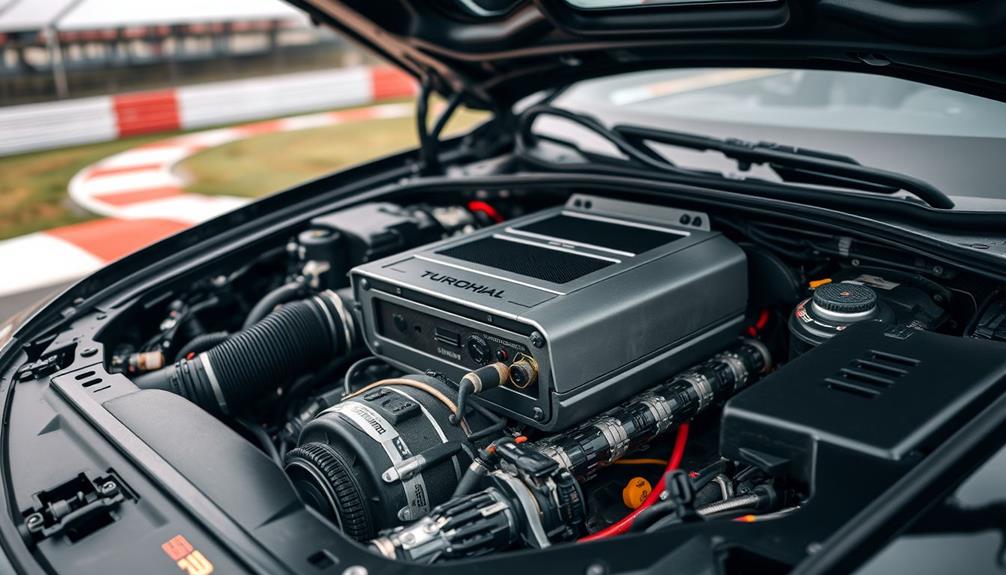
In the quest for vehicle performance, safety and reliability shouldn't be overlooked. When you're tuning your car, like a Santa Fe, you want to enhance performance without compromising its integrity.
Tuning boxes can manipulate engine sensors for power boosts, but they may lead to dangerous overboost situations that affect safety and reliability.
Make certain to take into account these factors when thinking about tuning options:
- Increased Knock Sensor Activity: Tuning boxes can create oscillating torque, potentially causing long-term engine damage, especially during drag racing.
- Custom ECU Calibration: This offers a more reliable boost by adapting to real airflow and torque, minimizing clutch slip in dual-clutch transmissions.
- Maintained Combustion Temperatures: Richer lambda settings in custom tunes keep combustion cooler, reducing knock risk.
- Improved Driveline Safety: Accurate torque reporting in custom tunes prevents gearbox issues linked to improper tuning.
Ultimately, while tuning boxes might seem appealing for a quick performance gain, custom tunes provide a safer, more reliable option that guarantees your vehicle remains in top condition for all your driving adventures.
Real Customer Experiences

Many customers like you have reported impressive performance improvements with tuning boxes, claiming gains of up to 40 bhp and 60 lb-ft torque.
However, some have encountered reliability issues, including concerns about heat and engine management.
As you weigh your options, it's worth comparing these experiences to custom ECU calibrations that promise even better performance and reliability.
Performance Improvements Observed
Customers have consistently shared their excitement over the performance improvements they've experienced with tuning boxes, particularly with models like the RS4. They report impressive gains, including an increase of 40 bhp and 60 lb-ft of torque, bringing the total output to 495 bhp and 560 lb-ft. This boost makes driving more exhilarating, and many enthusiasts appreciate the immediate effects on acceleration and responsiveness.
Here's a quick overview of the performance improvements observed:
- Significant power increase: Achieving up to 495 bhp and 560 lb-ft torque.
- Enhanced driving experience: Noticeable changes in throttle response and acceleration.
- User satisfaction: Many customers report a thrilling ride post-installation.
- Immediate results: Performance gains are often felt right after tuning box installation.
However, while these improvements are enticing, it's crucial to be aware of potential long-term issues that could arise.
Many customers have noted that although the initial performance is exciting, tuning boxes can lead to complications down the line. Understanding both the benefits and risks will help you make an informed decision about whether a tuning box is right for you.
Reliability Issues Noted
Tuning boxes may promise impressive performance gains, but real customer experiences reveal a troubling pattern of reliability issues. Many users have reported long-term engine problems stemming from improper ECU adjustments.
You might notice oscillating torque levels and increased knock sensor activity, which are clear signs of a lean mixture that could damage your engine under heavy loads. The manipulation of engine sensors by these boxes can lead to overboost scenarios, putting unnecessary strain on your engine and resulting in premature wear or even failure.
This isn't just speculation; countless drivers have shared their frustrations about the less-than-optimal torque curve produced by tuning boxes compared to custom ECU calibrations. This can cause driveline issues you probably don't want to deal with.
If you've switched from a tuning box to a custom tune, you may have experienced a noticeable improvement in engine health and performance stability. Many customers report reduced combustion temperatures and a safer overall driving experience after making the switch.
It's crucial to weigh these real-world experiences against the initial allure of tuning boxes before making your decision.
Tuning Box Comparisons
When considering performance upgrades, tuning boxes often catch your attention with promises of instant power boosts, but real-world experiences tell a different story.
While many users report immediate gains—like a 40 bhp increase and 60 lb-ft of torque—the drawbacks can overshadow these benefits.
Here are some common customer experiences with tuning boxes:
- Engine Management Issues: Many experience problems like overboost and oscillating torque, leading to inconsistent performance.
- Knock Sensor Activity: Manipulation of engine sensors can increase knock sensor activity, risking long-term engine damage.
- Heat Management Problems: Users often face overheating issues, raising concerns about reliability over time.
- Custom Tuning Benefits: Switching to custom ECU calibrations frequently results in smoother performance and better combustion management.
The feedback is clear: while tuning boxes may offer peak performance, they tend to compromise drivability and safety.
Users altering to custom solutions report improved control over combustion temperatures, which helps mitigate risks associated with gearboxes and clutches.
Ultimately, it seems that tuning boxes may not be the best choice for those seeking reliable enhancements.
Frequently Asked Questions
Do Tuning Boxes Actually Work?
Tuning boxes can boost performance by altering sensor readings, but they might not adapt well to your engine's needs. You could experience power gains, but potential long-term damage and reliability issues might outweigh those benefits.
Do Performance Tuners Really Work?
Like a magician's trick, performance tuners can deliver impressive results. However, you should consider their reliability. While they boost power, they might also jeopardize your engine's health. Custom calibrations often provide safer, more effective enhancements.
Can Tuning Boxes Be Detected?
Yes, tuning boxes can be detected. Your vehicle's ECU often flags discrepancies, and modern diagnostics reveal modifications. Dealerships or emissions tests might trace these changes, potentially voiding warranties and rendering the tuning ineffective.
Are Performance Tunes Worth It?
You'll find performance tunes are definitely worth it if you want substantial power gains and improved throttle response. Custom calibrations offer reliability and efficiency that tuning boxes just can't match, ensuring your vehicle performs at its best.
Conclusion
In the world of car tuning, tuning boxes can feel like a magic potion, promising instant power. But just as a wizard's spell can have unforeseen consequences, so can these devices. While they might offer a thrilling boost, consider the hidden risks lurking in the shadows. Custom tuning is like crafting your own spell, tailored to your engine's unique needs. Ultimately, the choice is yours: chase the thrill or guarantee your ride's long-term health. Choose wisely!




